How inflation is hurting farmers
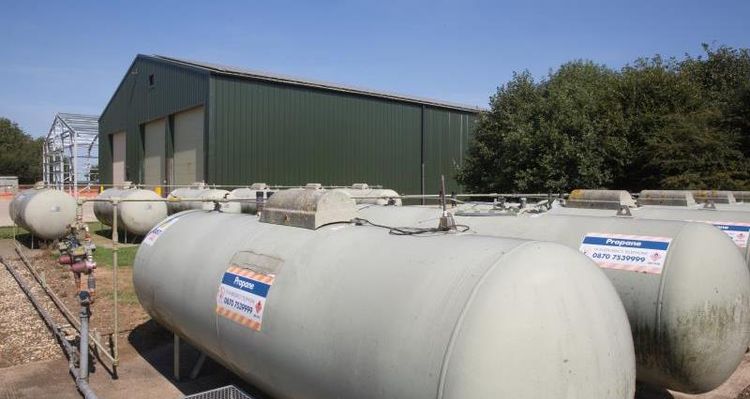
High Gas Prices Burden Farming
The rise in prices, known as inflation, still has an influence on the items and services that are crucial for farmers to operate their businesses. Nevertheless, the effect of inflation is not consistent. Andrew Francis, the senior advisor for business competitiveness at NFU, sheds light on what this implies for you.
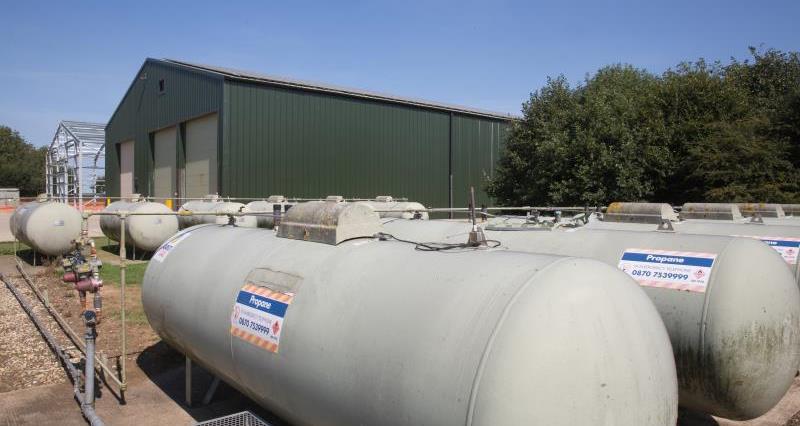
Inflation refers to the increase in prices that typically happens as time goes by. This price hike is commonly presented as a percentage on a yearly basis (for example, 5% per annum). Ultimately, a growing inflation rate means that our purchasing power diminishes over time.
The inflation rate in the United Kingdom is evaluated by the ONS (Office for National Statistics), which regularly observes the costs of approximately 700 products. This index is referred to as the CPI (Consumer Prices Index) and is frequently mentioned in news publications.
UK Inflation Status
The existing rate of inflation has occurred in the past. It reached 8.4% in June 1991 but declined to 1.1% in April 2000. It remained at a low level until April 2021. However, the significant surge in inflation, caused by the shortage of supplies after Covid and more recently, the conflict in Ukraine, has caused energy and food prices to rise sharply. Currently, they stand at 7.9% for the 12 months leading up to June 2023. Additionally, the UK has recently seen numerous strikes by public sector workers due to dissatisfaction with pay raises that are much lower than the current inflation rate.
In June 2023, the Consumer Price Index (CPI) dropped to 7.9% compared to the same month last year, which was 8.7%. The decline can be attributed to lower petrol and diesel prices, which played a significant role in driving down the overall inflation rate.
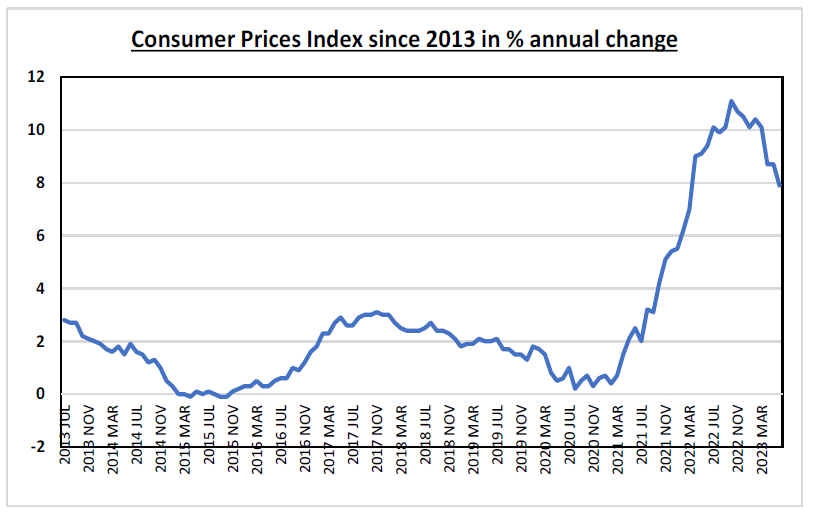
There were no significant factors that counterbalanced the increase in the rate. Actually, the price of motor fuels decreased by 22.7% from June 2022 to June 2023, following a 13.1% decrease from May 2021 to May 2022. This drop in price can be attributed to the decline in the value of Brent crude, which serves as a standard for measuring the price of oil. It plummeted from $125 per barrel in early 2022 to $79.60 per barrel at present.
Graph 1. Inflation rate of goods and services purchased by consumers, starting from 2013.
Agriculture's Pain Points
Farmers have seen an increase in the costs of the essential items they need to run their businesses, along with the rising prices of everyday goods that everyone is facing. The latest official data from Defra is up to April 2023. The majority of input costs have actually decreased over the past year, particularly in relation to fertilizers such as ammonium nitrate (AN). This is because the price of gas, which is used in the production of AN, has dropped from over 400p/therm in 2022 to 102p/therm in April 2023. Gas prices are known to fluctuate greatly and are more sensitive to price changes compared to other commodities like oil, mainly due to weather conditions or political events.
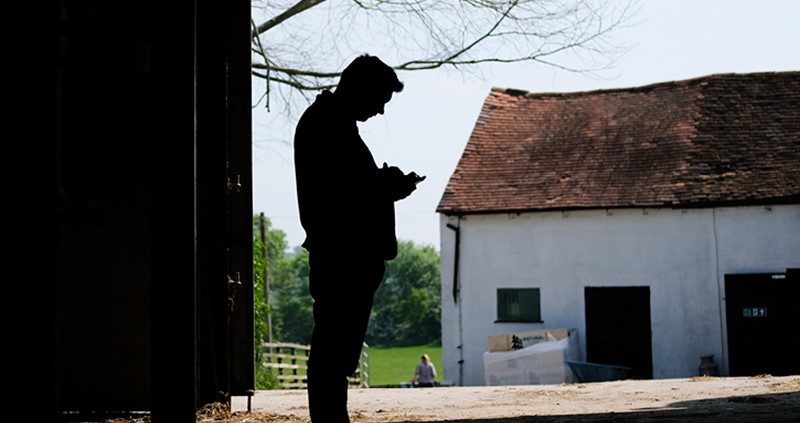
Plant protection products (PPPs) have experienced a 15% rise, according to experts. Analysts attribute this increase to ongoing disruptions in production caused by the pandemic, shortages of labor, escalating shipping expenses, and delays, in addition to a surge in demand. Over a span of two years, almost all categories have witnessed a growth due to a general price surge of 28.5% in all areas, which is putting pressure on the profitability of farmers' enterprises.
The cost of constructing and upkeeping structures has seen a significant rise in the cost of iron (which is later converted into steel) over the last couple of years, along with the consequent increase in labor expenses related to that maintenance. As for animal feed, the prices have been influenced by the surge in the cost of wheat, although it is expected that these prices will decrease in the future.
The prices of oil and gas, which reached their peak in 2021/22, are now decreasing because the UK has managed to secure alternative sources (especially for diesel) that are not from Russia. The future prices indicate a consistent decline. As a result, there should be noticeable decreases in the expenses related to energy, lubricants, and PPPs.
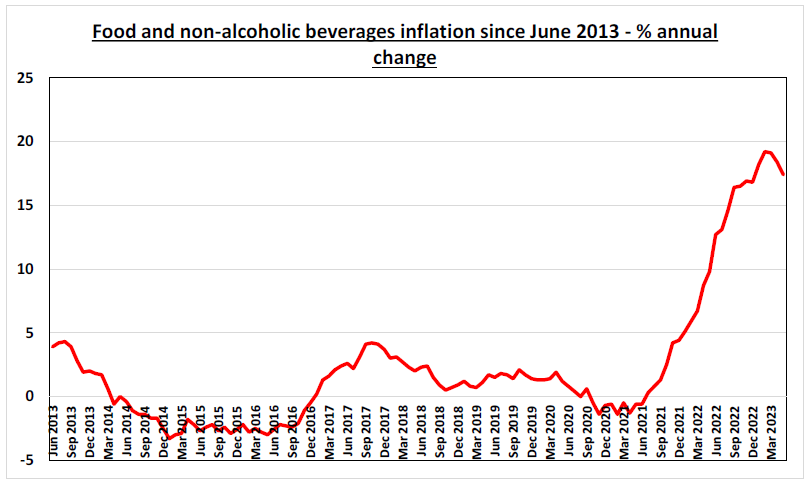
Image 2. The Defra Agricultural Price Index - for the year and two years leading up to April 2023.
Reducing Food And Drink Inflation
The cost of food and drinks at retail stores has increased significantly, but it seems like the rate of increase reached its highest point in March 2023 and is now starting to decline. From June 2022 to June 2023, there was a 17.4% increase in food and non-alcoholic beverage prices, which is slightly lower than the 18.4% increase seen from May 2022 to May 2023. In fact, this is the highest level recorded in over 45 years. Estimations based on a model indicate that it may have even reached 21.9% in August 1977.
Graph 3. Rise in prices of food and non-alcoholic beverages from October 2012 (yearly % fluctuation)
According to the Office for National Statistics (ONS), approximately 50% of grown-ups have decreased their food purchases during the last fortnight. The primary factor influencing this decline was a reduction in the consumption of dairy products like milk, cheese, and eggs. However, there has been an increase in the purchase of sugar-based products, which can be attributed to the surging global sugar prices.
Image 4. Detailed analysis of expenses, encompassing the income received by the farmer and the profit derived from the retail price of five prevalent items (reference: Sustain).
We have taken note of the July statistics released on August 16th and will continue to provide updates in our blog post.
Discover Support Options
Have Any Questions About This Page?
After you have sent in your inquiry, a representative from NFU CallFirst will get in touch with you. If necessary, your inquiry will then be forwarded to the suitable NFU policy group.









































